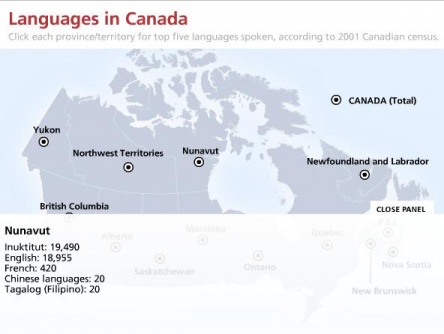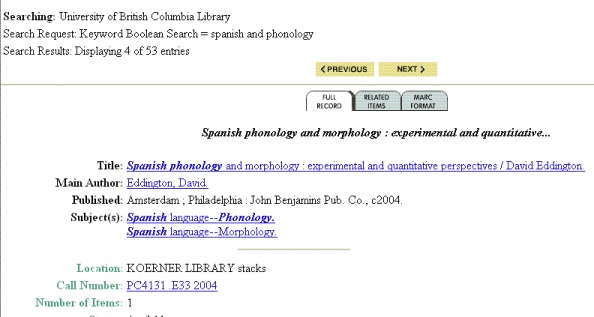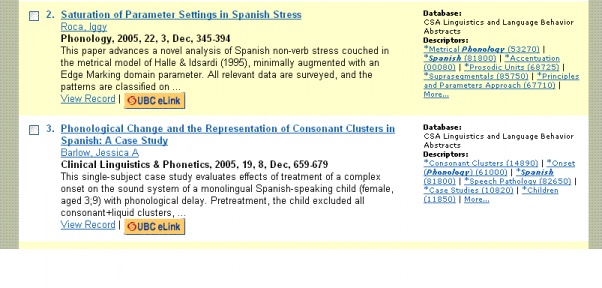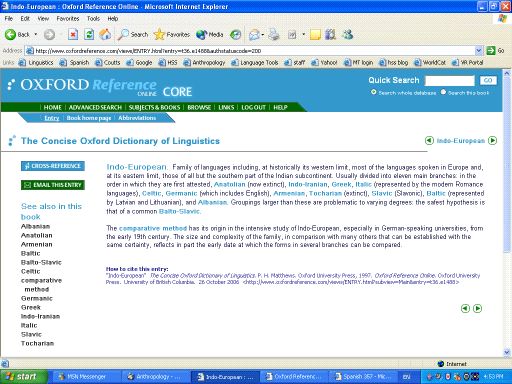November 10th, 2006 by Susan Atkey | No Comments »
UBC Library is currently trialling two new databases from CSA, COS Funding Opportunities and Community of Scholars.
COS Funding Opportunities is a compiled database of available opportunities for grants, fellowships, prizes and other type of funding for any discipline, worldwide. Opportunities come from the public and private sector, including governments, foundations and societies, and corporations. Each record is researched, verified, and indexed to ensure accuracy, timeliness and quality of data. Each record includes information on deadlines, amount of award, any eligibility criteria, and contact information for more information from the sponsoring organization.
Community of Scholars provides authoritative information about more than 1 million scholars and organizations around the world, including verified affiliation and publication information. This database is a unique tool for finding researchers by specific area of study. Linguists, check your entries – if you want to make changes or additions, there’s a handy form in the database that allows you to do so.
The trials are until November 30; please send any feedback to Doug Brigham, eResources Librarian.
Posted in Electronic Resources | No Comments »
November 9th, 2006 by Susan Atkey | No Comments »
Need to get reacquainted with the library after years of being away? Come to the “Back to Basics: Library Skills for Returning Students” session on Thursday Nov 16 from 12:00 noon – 2:00 pm in Koerner Library.
You’ll learn the basics of doing library research in an electronic world from finding books in the library catalogue to searching and accessing articles online. There will be lots of opportunities for hands-on practice and questions. This session will be most helpful for returning students in the Humanities and Social Sciences, but all are welcome.
Interested? Sign up here! (And check out the Library Instruction calendar for more offerings throughout the year.)
Posted in At the Library | No Comments »
November 8th, 2006 by Susan Atkey | No Comments »
Check out this interactive language map of Canada, produced by the CBC. Click on a province to display the top 5 languages spoken at home for each province and territory of Canada, according to the 2001 census. BC’s top five? English (3,521,730); Chinese languages (208,080); Punjabi (125,920); French (53,615); and Tagalog, or Filipino (37,830).
Nunavut’s numbers give an interesting snapshot of the area:
– Inuktitut speakers outnumber English speakers, and,
– Chinese language speakers and Tagalog (Filipino) speakers are tied for 4th place with 20 speakers each.

If you’re looking for more detailed information on the languages of Canada, you can try Stats Canada Census 2001 Topic Based Tabulations and look for #6 in the list, Language Composition of Canada. Tables include:
Detailed Mother Tongue
Language Spoken Most Often at Home
Knowledge of Official Languages
Various Languages Spoken
These tables provide a comprehensive breakdown of languages by a wide range of variables such as age, gender, education, and income. If you use the 20/20 software that StatsCan provides, you can pull out the data for just the variables you are interested in (rather than looking at all the provinces or all languages, for example).
Statistical data can be challenging, so if you’re having trouble pulling out the numbers you need, please come down to the Koerner Library reference desk (2nd floor) and chat with a librarian. (Or contact me directly; details at the top left.)
Posted in Electronic Resources, In the News | No Comments »
November 7th, 2006 by Susan Atkey | No Comments »
I’ve had a few questions from students in LING 311 (Studies in phonology) looking for books and articles. I’m posting some tips for those of you who are still looking for resources on the phonology of your language.
To find books, try a search in the library catalogue. A keyword search for “phonology and (yourlanguage)” will usually turn up some results. When you look at the catalogue record for a book that looks good, notice the hyperlinked subject headings:

You can click on those subject headings to find more on that same topic. You’ll notice in the screen shot above, one of the subject headings is Spanish language–Phonology. You can also use that same format to do a Subject Heading search in the catalogue. (Remember to replace “Spanish” with whatever language you are interested in! And don’t forget to select “subject Heading” as your search type – the default is keyword.)
To find articles on phonology, the best place to search for journal articles is the Linguistics and Lanugage Behavior Abstracts database, which indexes all the main phonology and linguistics journals. Try a search for your topic and then click on the UBC eLink icon to find a copy of the article (if UBC Library subscribes to that journal, of course!)

Posted in Assignments, Phonetics | No Comments »
October 4th, 2006 by Susan Atkey | No Comments »
Overwhelmed by information? Tomorrow in Koerner Rm 217, Sally Taylor and I will be presenting a session on “Current Awareness Tools” to help you keep up-to-date with information. We’ll look at a variety of current awareness tools you can use to keep up-to-date in specific or interdisciplinary fields of research. Come and learn how to set up profiles and searches on various bibliographic databases, free table of contents websites and the latest news from Web search engines, and news services.
This session is part of the Grad Students Workshop series. Register online or drop by room 217 at 9:30 am.
Posted in At the Library | No Comments »
September 6th, 2006 by Susan Atkey | 1 Comment »
Oxford Dictionary of Lingustics is an excellent source for looking up new terms and unfamiliar concepts in Linguistics. No need to come to the library – this eBook is available to UBC students, faculty and staff from the comfort of home or office via the web.
Short, clear entries each end with a ready-made citation to the entry.. For example, here’s the entry on Indo-European
:

Note the handy “how to cite this entry” section towards the bottom. Just copy and paste into your bibliography or reference list!
Bookmark the dictionary now! Or just look it up in the library catalogue when you need it. The quickest path is: www.library.ubc.ca > Find –> Title –> dictionary of linguistics electronic resource, then follow the link.
Posted in Electronic Resources | 1 Comment »
September 5th, 2006 by Susan Atkey | No Comments »
UBC Library has a new interface for its journal collection, via a product called Serials Solutions. When you search for an ejournal, you’ll notice a slightly different look. The benefit? The new interface will link you to both the print and electronic holdings of the journal. It will also tell you in which database the journal can be found.
Questions and comments welcomed, via this form, or contact me and I will forward your feedback.
Posted in At the Library | No Comments »
August 30th, 2006 by Susan Atkey | No Comments »
Does the sound of a word (phonology) tell you anything about how it is used (its lexical category)? Or is the relationship arbitrary? The standard view since Saussure has been NO, there is no correlation between word sound and word meaning. However, a recent paper by Cornell University researchers argues that adults do use the relationship between how nouns and verbs sound and how they are used to guide their sentence comprehension.
The paper was published in the Proceedings of the National Academy of Sciences (PNAS) to which UBC Library subscribes. Read it here, or, read the news brief from Newswise for a quick summary.
Posted in In the News | No Comments »
August 29th, 2006 by Susan Atkey | No Comments »
RefWorks is a web based citation management tool that the UBC Library licensed in April 2005.

Starting in August 2006, the UBC Library will have access to the add on module, RefShare. RefShare provides a quick and easy way to share references with others at UBC and globally with researchers who have internet access. RefShare creates of a website for the RefWorks database or folders and allows users to search, export references and/or create bibliographies. The website can be shared on a centrally created RefWorks webpage, posted on a particular website or in WebCt and/or sent to a specific group or person by email.
For more information and instructions on using RefShare, visit the RefWorks Help Guide and click on RefShare.Some uses of RefShare
-post reading lists on a course website (the UBCeLink will also appear and be accessible for UBC students, faculty and staff)
-share a RefWorks database for collaboration with researchers at both UBC or at other institutions
-share a RefWorks database of research done by UBC faculty
View some of the examples of UBC RefShare Databases and Folders
Contact me if you’d like a demo of how RefWorks and RefShare can help you manage and share your research and citations.
Posted in Electronic Resources | No Comments »
August 3rd, 2006 by Susan Atkey | No Comments »
| A recent study by researchers at The University of Toronto shows that the slang and abbreviations used in instant messaging are not ruining the language of teens. Linguists Sali Tagliamonte and Derek Denis studied about 70 Toronto teens and compared their use of language in speech and instant messaging. They presented their findings at the Linguistics Society of Canada and the United States in their session “LOL for real! Instant Messaging in Toronto Teens”. You can read more about Sali’s sociolinguistic research on Teen speech on her home page. Try an author search in the Linguistics and Language Behavior Abstracts for more citations, and follow the UBC eLink icon to find the text of the articles at UBC Library.
|
 |
Posted in In the News | No Comments »





